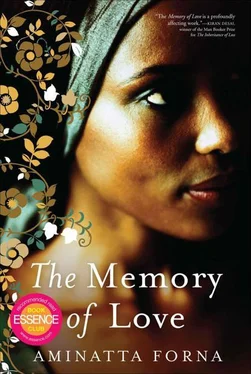For the next three days Kai walked alone to the hospital, where the medical staff continued to report for work and treat the wounded with detached determination. This was their job, their life. At those times Kai was happy.
The memories come at unguarded moments, when he cannot sleep. In the past, at the height of it, he had attended to people whose limbs had been severed. Working with a Scottish pain expert years later, he treated some of those same patients again. They complained of feeling pain in the lost limbs, the aching ghost of a hewn hand or foot. It was a trick of the mind, the Scotsman explained to Kai: the nerves continued to transmit signals between the brain and the ghost limb. The pain is real, yes, but it is a memory of pain.
And when he wakes from dreaming of her, is it not the same for him? The hollowness in his chest, the tense yearning, the loneliness he braces against every morning until he can immerse himself in work and forget. Not love. Something else, something with a power that endures. Not love, but a memory of love.
A day passed. Then another. The clouds hung thick over the city, only their patterns altered with the wind. It was as if we were trapped on the dark side of a mirror. We could see the world, people running through the rain, children playing in the puddles, but we could not hear them. The house was quiet. One or two of Julius’s colleagues from the university called, his absence at a meeting had been noted. We told them he had been called away on a family matter. No news of Kekura. The dancer fellow, I remember, dropped by. Somehow he had heard what had happened and he arrived, throwing out offers of help, claiming to have various contacts here and there among the police. I did not like his familiarity, the way he sat, legs splayed, arms stretched out along the back of the chair, making a display of himself. Nor did I believe his claims. Were the police taking dancing lessons now? But Saffia would take help where she found it. I had a growing sense by then that no good would come of stirring things up. Better to sit it out. And anyway, sure enough, the fellow returned hours later, with nothing to show for his apparent efforts.
After the door closed behind him, Saffia began to cry.
I moved over to sit by her. I put my arm around her. She neither resisted nor made to move away. The sobs came, dry, uneven, causing her shoulders to shudder. Her head rested on my shoulder. From her hair rose a close, earthy scent. A tear landed upon my shirt, and I felt it soak through the cotton and touch my skin. I stayed sitting there as long as I could until I felt the shift in her. Any moment she would regain her composure and perhaps feel awkward with our proximity. I stood up.
‘It will be over soon. There’s a procedure for these things, soon enough we will know.’
My words provided the break. She sat up straight, wiped her eyes and blew her nose.
‘Can I fetch you something?’ I said. ‘Shall we go and get something to eat?’
‘No thanks, Elias. I should stay close to the phone. But I am terribly thirsty.’
In the kitchen I opened the fridge door and reached for a bottle of water, but instead took a bottle of Coca-Cola, poured half of it into a glass along with a slug of Julius’s whisky. I put the glass on the table in front of her. She picked it up and took a sip.
‘What’s in here?’
‘A little whisky,’ I replied. ‘Just to calm you.’ She nodded and took another sip, began to rehearse aloud details from the previous days, starting with the morning after the party, a fingertip search through her own mind for whatever it was she had missed.
Outside the window, the blue of the sea turned grey and then black. In the garden the colours grew solemn and withdrew. The phone was silent. Between ourselves, little of consequence was said. I refilled Saffia’s glass, once, twice. She did not move from her place on the settee.
I stepped outside on to the verandah to gaze at the sky, the lead-blue darkness settling over the city. I lit a cigarette and smoked it in the darkness. Through the glass of the sliding door I could see Saffia. She sat in a coin of bright light from the lamp, her head rested on her forearm across the back of the settee. I stood and watched, I shrouded by darkness, she in the light. Something in her pose struck me, the weight of her head where it rested upon her arm. I realised she was asleep, or else on the verge of it. For several minutes I remained where I was, quite still.
I wished I could stay there all night. I let go of my self-imposed restraints and allowed myself to fantasise, to think what it might be like. That this was all mine, my home, lit up against the night. The sleeping woman inside my wife. Not sleeping from exhaustion, fear and whisky. But slumbering in peace.
I wished Julius would never come back.
The next day, at eleven o’clock in the morning, I was arrested. Two plain-clothes policemen were waiting for me on the stairs outside my apartment as I returned home carrying a freshly purchased cake for my breakfast. We drove away through the city and from the back of the car I watched people going about their business; already I envied them the mundane ritual of their mornings.
After a few minutes the car pulled up outside an unobtrusive single-storey building and I was taken inside. Two men were standing in the lobby. They paused their conversation, their eyes followed me as I was led by. A remark was exchanged with one of my escorts. Something frivolous, followed by a laugh. We passed into a corridor, a series of grey-painted doors on either side. One of the doors was open. They pushed me inside. A cell, windowless apart from a letterbox slit of window high up a wall. Stains on the wall. The air heavy with the reek of body odour. A desk, a chair. No other furniture. I placed the cake upon the desk and sat down.
I waited. I took the time to review my situation calmly. No point panicking. Julius, Yansaneh, Kekura. No doubt whatsoever I had been arrested in connection with those three. But what were they involved in? And what did it have to do with me? I knew nothing. I would tell that to the police. But would they believe me? It seemed unlikely anything could be that simple. With the thought my heart beat harder. They must believe me. I counted my breaths. One, two, three, four.
Outside the temperature rose and so did the temperature in the room. I pinched at the cloth of my shirt. I felt sticky. I heard occasional sounds of people passing down the corridor. Nobody stopped. Nobody came to the door. I had been in need of the toilet when I arrived, and as I sat there the pressure inside my bladder began to mount. I considered my options. I could continue to wait. I could call someone. It occurred to me they had left me without locking the door. I could step outside at any time, though that seemed somehow reckless. I held on ten more minutes, then stood up and knocked on the door. I listened. I waited. I rapped again. Footsteps in the corridor. The door opened and I took a step backwards. A man leaned in, glanced at me, pushed the door fully open and held it for a second man, who stepped into the room.
‘Mr Cole. Please sit down.’
The man in front of me was short, with very black skin, dressed in a charcoal-grey suit with short sleeves and button-down pockets; he was carrying a manila folder. The first man placed a chair inside the door and departed. The second man took the chair and placed it, not opposite me, as one might imagine, but on the same side of the desk. When he sat down our knees and elbows were practically touching. He placed the papers on the desk and folded his hands.
‘I must apologise for having inconvenienced you, Mr Cole. I know you are a teacher at the university.’
Читать дальше












